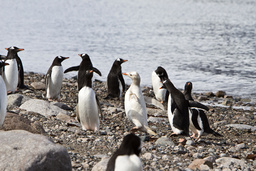An adult Leucistic Gentoo penguin (Pygoscelis papua) in Neko Har

An adult Leucistic Gentoo penguin (Pygoscelis papua) in Neko Harbor, Antarctica. Leucism is a condition characterized by reduced pigmentation in animals. Unlike albinism, it is caused by a reduction in all types of skin pigment, not just melanin. A further difference between albinism and leucism is in eye colour. Due to the lack of melanin production in both the retinal pigmented epithelium (RPE) and iris, albinos typically have red eyes due to the underlying blood vessels showing through. In contrast, leucistic animals have normally coloured eyes.The Gentoo Penguin is one of three species in the genus Pygoscelis. It is the third largest of all penguins worldwide, with adult Gentoos reach a height of 51 to 90 cm (20-36 in).There are an estimated 80,000 breeding gentoo penguin pairs in the Antarctic peninsula area with a total population estimate of around 314,000 breeding pairs in all of Antarctica. Males have a maximum weight of about 8.5 kg (18.8 lbs) just before moulting, and a minimum weight of about 4.9 kg (10.8 lbs) just before mating. For females the maximum weight is 8.2 kg (18 lbs) just before moulting, but their weight drops to as little as 4.5 kg (10 lbs) when guarding the chicks in the nest. Birds from the north are on average 700 g (1.5 lbs) and 10 cm (4 in) taller than southern birds. They are the fastest underwater swimming penguins, reaching speeds of 36 km/h. Gentoo Penguins are listed as Near Threatened on the IUCN Red List.